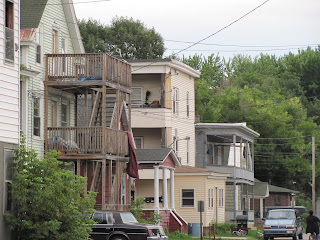He lived in the wet, moldy pipes of the ship, scurrying from place to place under the floors and in the walls. He could see the people through screens, and could smell them cooking things and hear them talking, shouting, doing their people things. But they didn't pay him much mind, any more than the rats that lived with him in the dark pipes.
The rats were his friends, his only companions. Marvin didn't eat the rats, unless he was very very hungry. Mostly he wanted to play with them but sometimes when they played he would become too happy and try to hold one in his mouth and shake his head in joy, and the little rat would die. Then Marvin would be sad, but only for a moment. Then he would eat the rat.
The ship swayed as it moved through space, the metal softly groaning in its timeworn hull. Marvin knew the ship very well. He was born in the ship, in a dirty pipe; his mom was born in the ship, and his dad also. There used to be more of his kind, but now there were only the rats. His kind had died out over time, sometimes because of the people, sometimes for no reason at all.
He feared the people, and he especially feared their rulers, the furry cat-queens that sat on big pillows and ate food of unimaginable deliciousness. Marvin would peer very carefully at the cat-queens through the grates of the pipes, and wonder at their beauty. But he dared not approach one, for they were too far above his station, and what would he say, anyway?
Over time, Marvin grew lonely. He wanted very much to speak to someone, but the rats were no good at conversation. So he stayed quiet, and watchful, and he waited for scraps that the people would drop or, if he was really lucky, a dish of food left behind by a careless cat. Then he would swoop in, faster than anything, and lick the dish clean, and then disappear again into the pipes.
One day, the ship was making more noise than usual, a terrible racket. Marvin heard the people running about, shouting and calling to each other. He saw a person running by, carrying a cat, and the cat looked worried, and suddenly Marvin was very worried, too. What could a cat, as lucky as any creature Marvin could imagine, worry
about?
The ship screeched and wailed, and it jerked back and forth. Marvin was thrown against the walls of the pipe, and then the ship stopped jerking and it was even more terrifying: Marvin could feel his stomach falling into his feet, and the walls around him grew hot.
Then there was a crash, and he was thrown into the top of the pipe, which thankfully wasn't very far from the bottom of the pipe. The metal around him crunched and folded and broke, and then all was still. Quiet. And a light, brighter than anything Marvin had ever seen, broke through the pipe, just ahead of him, in a narrow beam.
Marvin limped cautiously toward the light, his bones bruised and blood on his fur. The light came from the up-side of the pipe, a little hole. He touched the ray of light with his paw, and his paw went right through it. He pressed his nose to the hole, and smells of every kind, a symphony of smells, so wonderful it made him yelp, made his brain ache with joy.
He tried to push his nose through the hole, but he couldn't, so he kept trying for a long time, until he was very tired and the light went away and it was dark. He fell asleep, exhausted, in the pipe.
When he awoke, it was with a start. Such strange noises! And behind the noises, even more scarily, there was quiet. Then he realized why it was quiet: none of the people were making their noises. Just the sound of wind and the sweet singing of distant creatures to greet him. He went to the light and looked mournfully out the hole: What was out there? Where were his friends, the rats? And even his enemies, the people? And his rulers, the rulers of all, the cat-queens?
He turned down the hall toward one of the people-rooms, but it was difficult to move through the crumbled metal. The edges of pipes scratched his skin and tore at his coat as he wiggled through narrow spots.
Finally he reached the people-room, and it was so full of the light that he buried his head in his paws. Then he looked up, opening first one eye and then the next, squinting against the magnificent sun that he had never seen. The up-side was so blue! He could see green tall-things and he gathered his courage, scrambling over toppled furniture and broken glass. Some of the people were there, not moving and silent, and he avoided them as he limped carefully out of the ship, into the sunshine.











































